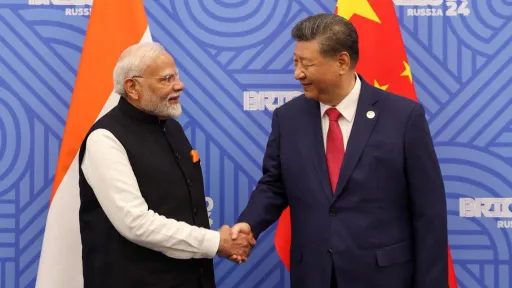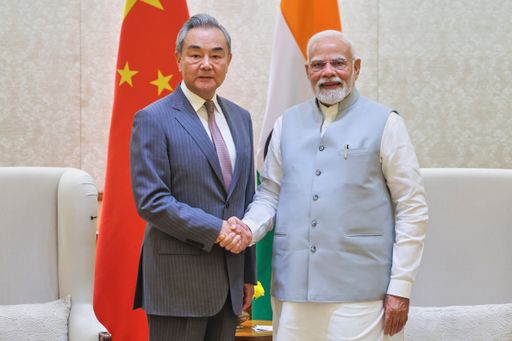Chinese President Xi Jinping and Indian Prime Minister Narendra Modi have begun a bilateral meeting in the northern Chinese port city of Tianjin, state media outlet Xinhua said on Sunday.
Modi is in China for the first time in seven years to attend a two-day meeting of the Shanghai Cooperation Organisation, where Russian President Vladimir Putin and leaders from Central Asia, Southeast Asia, South Asia, and the Middle East will gather with Xi in a powerful show of Global South solidarity.
The bilateral meeting took place five days after Washington imposed punishing 50 percent tariffs on Indian goods due to New Delhi's purchases of Russian oil.
This was the Indian leader's second meeting with Xi after one in Russia last year.
Analysts say Xi and Modi are looking to present a united front against Western pressure.

Improving ties
Beijing and New Delhi are tentatively rebuilding ties after a breakthrough meeting between the two leaders last October, which took place after they reached a deal on patrolling their contested border — the centre of a military standoff since deadly clashes in 2020.
Ties have thawed further in recent weeks as New Delhi seeks to hedge against mounting US tariff pressure, court China and maintain friendly relations with its ally Russia.
A key visit to India by China's Foreign Minister Wang Yi earlier this month saw both countries agree to resume direct flights, while China also agreed to lift export curbs on rare earths, fertilisers and tunnel boring machines.
China opposes Washington's steep tariffs on India and will "firmly stand with India," Chinese Ambassador to India Xu Feihong said earlier this month.
For decades, Washington painstakingly cultivated ties with New Delhi in the hope that it would act as a regional counterweight to Beijing.

Border issues
In recent months, China has allowed Indian pilgrims to visit Buddhist sites in Tibet, and both countries have lifted reciprocal tourist visa restrictions.
"Both India and China are engaged in what is likely to be a lengthy and fraught process of defining a new equilibrium in the relationship," said Manoj Kewalramani, a Sino-Indian relations expert at the Takshashila Institution think tank in Bangalore.
"I think the Modi-Xi meeting is likely to reiterate the commitment to continue along that path with broader government-to-government and people-to-people engagement."
Analysts expect trade and investment to be high on the agenda in the Xi-Modi talks, as well as flight connectivity and ongoing border issues.
Modi is also likely to raise the issue of terrorism, after an April attack on Hindu tourists in Indian Kashmir led to the deadliest fighting in decades between India and Pakistan.



















